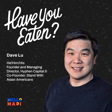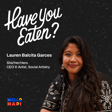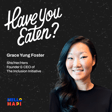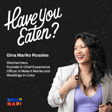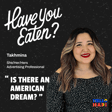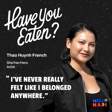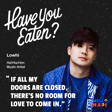Become a Creator today!Start creating today - Share your story with the world!
Start for free
00:00:00
00:00:01

From Oakland Chinatown to Silicon Valley, Lauren Lee Shares Her Family’s All-American Story
Through a series of dynamic and thoughtful conversations between Ji Bowlus (she/her) and guests, we will showcase how wellness intersects with the rich complexities of our diverse Asian diaspora community. We will bring the voices of the Asian diaspora from the peripheral to the center to empower, reclaim agency, and rewrite the narrative of well-being one personal experience at a time.
Transcript
Introduction to the Episode
00:00:00
Speaker
nourishing the mind body and soul for the asian diaspora have you eaten Hi, hello happy fam.
Meet Lauren Lee
00:00:08
Speaker
This is g again with another episode of have you eaten and it's a podcast as you know where um I bring on interesting people that I think you should know too um and today I have Lauren Lee with me and Lauren is a Oh my gosh, how do I even describe her? She is, I mean, yeah, look at her. She's giggly, um but she's just this happy, just this happy, bright spot in my day. And so I want to, you know, introduce you to her and have this conversation.
Founding 'Two Rooms'
00:00:45
Speaker
She also is a founder of something called Two Rooms, which is really amazing. um It's a, um I want to say it's it's not just a place Program or an event. It's actually an agent for community So it's building community creating places of belonging and I just think that is so amazing. So um Lauren welcome. Thank you so
Mixed-Race Identity
00:01:11
Speaker
much. I'm so excited to be here. This is so cool I love everything you guys do. I'm big band. So yeah, thank you and we always start with Lauren, how do you identify?
00:01:23
Speaker
Yes. My name is Lauren Lee. I use she-her pronouns. um I am half Chinese, half white, you know, mishmash. And both sides of my family go back pretty far. like um So I'm fourth generation Chinese American. um My family settled in Oakland, oakland Chinatown family.
00:01:46
Speaker
And then my mom's family can trace its roots back to the American Revolution. So that's like, yeah, it's a very, very American family. Um, I am an entrepreneur. I, uh, am an artist supporter. Um, I, what else about me? I love dogs and I love, uh, music. I don't know what else I think that's it. I think that covers pretty much everything.
00:02:11
Speaker
Yeah, you you had me at dog lover. Yes. Oh my gosh. Yeah. I have a friend who accuses me of like catcalling dogs. Like every dog I see, I'll point out and be like, Oh my gosh, what a cute boy. You know, like what? Oh, that is so cute. Yeah. There's that, there's that meme where, um, a wife sends a text to her husband that says, uh, I fell in love today with someone and the husband writes back. Okay. What kind of dog is it? yeah That's totally me too. Yeah. So your fourth generation, that just kind of like blows my mind. I mean, so the only reason why it blows my mind is because I'm a kid of a immigrant. I'm 1.5 generations. So I can't even, I can't even understand what that means to be fourth generation and then to be mixed race. Right. As far as I know, I'm full Korean. I don't, I mean, I haven't taken an ancestry test or anything, but that's what I'm told.
Cultural Identity and Assimilation
00:03:13
Speaker
I would love to dive into that conversation and learn a little bit more about what that was like for you growing up and how that shaped you into who you are today. Your family's from Oakland. Is that where you grew up as well?
00:03:33
Speaker
Um, so I grew up in the Silicon Valley actually, which is a super weird place to grow up. Um, my, uh, where do I start? So my grandparents grew up in Oakland, Chinatown in like the 50s, like thirties to fifties. And in that time,
00:03:49
Speaker
ah they were pretty poor and so their story was one of like we're going to be successful upward mobility all that kind of stuff and so my dad became an engineer my uncle became a doctor you know very typical like asian-american story they both moved out to the suburbs at that time um and then they moved out before the silicon valley was the silicon valley and so um Yeah, so I grew up pretty much in the burbs and ah grew up upper middle class and um white passing and Asian American at the same time and um Silicon Valley is very, ah very half and half Asian and white. um And so I saw
00:04:29
Speaker
I saw a lot of myself reflected in my peers, but not exactly who I was. And so um I grew up with a lot of like second gen kids, 1.5 gen kids who like knew what all the Asian snacks were, could speak Mandarin, like could like had a closer identity to it. And so like as a kid, it was very much like, ah oh, you don't know what the snack is? like Oh, you don't know how to say this and that? and like Um, you know, it was very much a question of like, how Asian are you? Like pretty consistently. Um, and I didn't really understand it at the time, but, uh, my grandparents also raised my dad during McCarthyism. And so what that means is that as a Chinese American family in the U S during the red scare.
00:05:13
Speaker
um All Chinese people were assumed to be communists and that was the worst thing you could be in the 50s And so they set out to be as American as possible. And so they didn't speak Chinese in the home So my dad grew up totally speaking English and only understood Cantonese because of my aunt who lived in the same apartment building um and was determined to like hold on to culture and um and so because of that my family became very assimilated and very American and um And so like that was another layer of, like I don't know how Asian I am. like I think not very much. And so like always kind of handling that as a kid. um And then like as I got older, especially in college, like I started to get more into my identity and started understanding that
00:05:58
Speaker
um There were reasons my family shaped our identity in the way that they did as a means of survival.
Pride in American Heritage
00:06:04
Speaker
um And I don't begrudge them of that at all. like I think that what they did put us in a better place, um as sad as it is in the sacrifices that they had to make. But it's still like, it's kind of been a slow process of trying to gain My agent is back ah and trying to understand what that means. I'm just for me and who i am as someone whose family immigrated like a hundred years ago and ah what is asian identity me for me as someone who walks around being very white passing and um like how much my culture can i like publicly take part in if i look like this you know i'm like you know so it's um.
00:06:42
Speaker
But I think like there was a there was a time that I was very insecure about my identity and now I'm like a hundred percent secure and I make jokes about being a white woman and it makes people uncomfortable and like and I love that. So um yeah. So it's ah yeah. It's been a journey for sure. It's very like.
00:06:58
Speaker
um The asian experience Asian American experience is so vast. There are so many different things that people experience all the time that are not captured by, I think, what is very mainstream portrayal of what Asian American means or what it looks like or what it is. um And so I'm very proud to be a part of the lineage that I have i am a part of um because it shows that like that Asian Americans have been in the US for so long. And we're not foreigners. We belong here. Our families have grown up here.
Defining American Identity
00:07:31
Speaker
ah Yeah, like my grandfather served in World War II. Like my dad went to Berkeley in the 70s. Like um my, yeah, I don't know. Like I have photos of like my grandparents and my like
00:07:43
Speaker
family in the 40s and 50s doing like the most 50s stuff. like it's like There's a photo of all of them. Oh, that's so cool. Yeah, they're like around a turkey at Thanksgiving. and they're all like It looks like Americana, but they're all Asian. like It's amazing. Right. It's amazing. so um yeah Trying to understand like what that means when it's your story isn't really in the media all the time. and like Understand that it's still so a story we're telling, you know, so absolutely a hundred percent. I mean you said so many things there um But I want to touch upon this idea of being American Right. Yeah because America, I mean it It's a culmination of so many different ethnicities and cultures and can we really pinpoint
00:08:32
Speaker
you know, what does it mean to be American? um yeah And i I grapple with that. that you know, a lot too, because when people look at me, they're like, oh, you're not, you're Asian. You're, you know, and having to really fight for the idea that, no, I am American. and Like I am here. And, um, you know, I've been here all my life, basically since I was three. yeah Um, so what does being an American mean to you? Like, um what, like, what does it mean? yeah I know that's a, I know that's a really, um,
00:09:06
Speaker
hard question because I think it changes too like culture changes with culture changes all the time yes and um yeah so yeah just yeah how would you define being an American?
00:09:19
Speaker
Yeah, I was just explaining this to a friend recently that like um like my mom so my mom is is my white parent, and she is from the Midwest. She's you know dodged the American Revolution. like Her mom registered, and now I could if I
Influence of Diverse Cultures
00:09:33
Speaker
wanted to. It's a it's a it's a tricky situation, but um i like very very typically like American is what I'd describe.
00:09:42
Speaker
And I think, and my parents have been married for 40 years and they're still very much in love and it's really adorable. I think the reason that it works is that their cultures are really super similar. Like Midwestern white American is actually so close to Chinese that it's like, like they both value hard work. They both value indirect communication about issues and they both are like very, ah but like very like salt of the earth kind of people.
00:10:08
Speaker
um And I and I love that like I love seeing their relationship through this lens, but I'm like Oh, yeah, super like they have so much in common actually even though they're like an interracial marriage, you know um and I think American is I think there's certain values that make people very American, right? Like I think the belief that that hard work will get you places is very American. and Whether it's true or not, like I think that there's an idea that hard work um is important and that like our that purpose is important and individuality is important and who you are and who you develop and to be and and contributing to society as an individual is very American. um I don't know if I agree with those things, but they're definitely things that I see in myself
00:10:57
Speaker
that I'm like, okay, I like, as much as I maybe don't want to believe in these things, I really do. And like, um, I think that that more than anything makes you American. I think that, um, see, and also seeing my family like try to mold themselves into a way that's like American, um, is but also very American that like, while you're like, it's while you're trying to, um,
00:11:25
Speaker
while you immigrated, you still like want to be a part of what we have going on, and this like big American dream, and um and you want to be a part of it. And I wish that like the American identity was more shaped by our immigrant culture. that i think that there's like I think it's like, what's the statistic? It's like by 2050, more than half of Americans won't be white.
00:11:47
Speaker
that it's like, I wish that Americanism was defined more by that experience of like being different, being an individual, having a story, having a background that does not originate here. Um, like I wish that that was, because I think that's more American than like the white picket fence fifties, like, you know, the, uh, narrative that's touted by some politicians. Right, right. Yeah. We all make America.
00:12:13
Speaker
I feel like. you know yeah um yeah So whether you're you know fourth generation, third generation, first generation, we all make up what's called America. And I think that's what's so beautiful about yeah this country.
Journey of Belonging
00:12:27
Speaker
um yeah That I get to sit here with you and talk to you about your experiences and and share mine and um and So you know growing up, though, you you touched on you know growing up and trying to fit into different different groups or being Asian enough. and yeah Tell us more about that. and yeah you know what I'm guessing, too, there was a lot of self-care that needed to happen right as you're like ah going through all of those things, especially as a teenager or in those formidable years.
00:13:01
Speaker
So tell us more about that journey and tell us more about how you were able to then grow up to be this amazing woman who is so um my heads out You know, you're you're now in this place where you are so um Assured and you're doing some amazing things community. Like what was that journey like? Yeah um I think like I think being mixed is an experience that a lot of people actually share, whether they're ethnically mixed or not. Because I think part of it is just wanting to fit in, wanting to belong, wanting to be understood. um These have been themes throughout my whole life that I've been like, I wish that, you know, I wish that I fit in. I wish that, um you know, that I'd be accepted by an in crowd or I wish that I'd like
00:13:51
Speaker
um you know that people would understand who i was and as i got older and i i formed tomorrow my own identity those questions those wishes turned more into like i wish people didn't assume things about me i wish that people would ask me about my own background or Um, you know, cause people would like, it's, it's hard because there's not as many stereotypes about mixed people. So I kind of get to tell my own story, which is great, but oftentimes people won't let me tell that story or they're not interested or whatever, or they'll make assumptions about who I am. And like, I, I just wish that I would, that people would just ask me questions and let me tell you who I am instead of you guess who I am and be wrong. you know and i think And the more that I dwell on that and the more that I'm like, what is my wish for the mixed community? It's actually applicable to everyone. like I think that asking anyone who they are instead of guessing and being wrong will make the world a better place. like Just ask people questions, be curious about people, um be curious about their story. Because even if someone's background and like
00:14:53
Speaker
I'm like you may think like oh i know another you know korean american one point five generation person friend their stories can be the same as this other one point five they're not gonna be the same and like there's gonna be fun things you can learn about people in their histories if you just ask.
Community Building through 'Mixed Mixer Dinners'
00:15:09
Speaker
Um, and so like, I think my journey through that has been, uh, tumultuous for sure. And like, um, learning to stand on my own two feet and learning to just, um, I think a sad part of it is like, understand, I think I came to a conclusion in my mid twenties that I was like,
00:15:26
Speaker
I was searching for a community where i would fit in and belong and ethnically and i think i reached a conclusion i was like i don't think there is one and i think i have to stand on my own and be my own person and like maybe that will do something and the most beautiful thing is like.
00:15:43
Speaker
Recently, I have, as I've been doing two rooms, and I've been meeting more and more people, um especially in entertainment, who are who are mixed, I like make a joke. I used to make this joke where I was like, all right, well, I'm starting an Illuminati, you're gonna get a letter in the mail, don't worry, just come to the address, whatever. And I'd make this joke over and over again.
00:15:59
Speaker
um And my sound guy for two rooms who's also mixed was like, all right, so when are we what are we doing this? And I was like, when are we doing what? So we started making these like we started hosting these potlucks for mixed people. um And so we're calling them mixed mixer dinners, which I came up with and I'm very proud of still. And it's been awesome. It's been awesome like it's been like so rewarding to like have this place where we can all all of us like misfit toys kind of can come to this island and like be around other people who have like the same experiences. um And it's been so beautiful to see it come full circle to a place where I was like, there's, oh, there's not a place where I'm going to belong to creating the place and having a place for people to come home to basically and say like, you know, it's weird to like have a room full of people be like, one person share like, Oh, you know, when you're walking with your non obvious parent and everyone in the room goes like, Hmm, yeah, And you're like, oh my gosh, I've never shared this with other people. That's so cool. It's been really like beautiful. like i think like um I'm so grateful for the journey that I've had. that i like I hope that it's easier for future mixed people, that there's more of a conversation around it.
Supporting Artists with 'Two Rooms'
00:17:13
Speaker
um But I'm also grateful for my experiences that they've led me to this point, that I can turn my experiences into a community for people who need it. um And then I also get to benefit from too, and like I can finally find that home too. so
00:17:25
Speaker
Yeah, I love you. So Danielle, who is our yeah um happy mic producer, I think went to one of your potlucks. Oh, yeah. she Yeah, she was so happy that she was there. And yeah, yeah she talked. Yeah, she talked a lot about it um yeah and how she felt belonging and all those things that you talked about. So tell the audience though, we've talked about two rooms, but we didn't really go into what that is. Like tell the audience what two rooms is.
00:17:54
Speaker
Okay, Two Rooms is my my baby. It is ah one room for friendship, one room for music. ah it's a monthly It started as a monthly artist showcase. So um I picked three artists, I advertised the hell out of them. And then ah people come to the show, they don't know them, they're up and coming artists. And so you just have a great night of music. um And the other part of it is like, there's this friendship angle where like in between sets, I will,
00:18:25
Speaker
I am see it also and I I like joke with people I'm like alright everyone turn around and tell someone hello like go make a friend or whatever and I've been told that it's very church-coded and I'm okay with that that's fine but yeah and I was like you know I make a joke that I'm like go make a friend go flirt a little bit like go go talk and um Between those two things like it's become this beautiful place that i've been dreaming of my whole career where um people feel safe where people get good music that's cared about where artists are cared about um and.
00:19:01
Speaker
That's it. And like I have all these other Easter eggs that kind of feed into these two values of quality music and quality community, which is like I feed the staff and the artists before the show. Like i I make my own food for them and I make sure that everyone's fed and feeling good. I pay artists a fair wage, which never happens in Los Angeles at this level that they're on.
00:19:26
Speaker
um like truly never happens. um I pay my staff also rare for music to like have like a one-off showcase where they're not like volunteers or interns or whatever. I make sure that like I book people who aren't you know like kind of like dangerous or might attract like a dangerous crowd or people who are like homophobic or sexist or racist or anything like that. Like I make sure that everyone like feel safe like in these in the artists that I book because they draw and a community that's you know the people who identify with their music. And so like I pay a lot of attention to that. um And also, like I just care about the artists I book, which honestly, like the more that I do it, never happens in LA. I've been to shows for like all these different shows that are on the same level for like a year and a half, two years.
00:20:15
Speaker
and nobody cares about who they're booking truly at this level that's like these new artists that are popping up and I'm lucky to live in the city where people move to when they're ready to take things seriously and so there's so much talent in Los Angeles that is like they're doing the same thing as people who are not talented like um and the people who book them like Don't care and and the reason and they and they're not inspired by their music they're not whatever they're just looking to fill a set but like the way that i pick artist is different because i. I want the quality of the music to be good but also like that means that i actually know that i know who they are i know what their influences are i know what their fans are like,
00:20:57
Speaker
um I know that they're going somewhere. I have a book that's like an autograph book that I joke with them that I have all the artists and their musician, all their band sign it. um And i I joke with them. I'm like, this is my retirement plan. Like when you guys become famous in 40 and in 40 years and I need to retire, I'm going to sell this book.
00:21:16
Speaker
and everyone's gonna like thump like thump through these pages and see like oh my gosh that was like that was town west oh my gosh that was like uh desa who's now googly eyes like oh my gosh like that's so crazy you know and i like and they laugh but i'm like no no no it's not a joke i really believe in you you know like i really think you're gonna be famous And, um, yeah, and it's just like that amount of care, uh, for people and quality is you can't find it anywhere in Los Angeles, like unless you're paying like really big bucks for it. Um, which I'm not at yet, but hopefully I will be one day. So I'm working on it. Yeah. I believe in you. I believe in you so much. Thanks. Um, and what can we do? What can, what can we as the wider,
00:22:00
Speaker
like community do to help help make that happen. Oh my gosh, come to the show. Like if you live in l LA, come to the show, follow the artists afterwards, you know, participate in the community aspects. I'm like, I'm looking to expand like the amount of ah things that I do. So I have like a um So right now I have a like ah a season ticket level where you can just every month it's 12 bucks and you just like come to every show or don't you can transfer your ticket or whatever. So that's like a way that you can like keep coming back and keep seeing people keep seeing friends also who also have a season ticket like you would like a baseball game or something like you get to know the people the other people. are not that's So yeah, um I also have an artist ah development program, basically. And so um we have like a workshop that happens. So if you have anyone in your life who's like an artist who's like fumbling through like, Oh my gosh, I don't know how to read this
Community and Kindness
00:22:52
Speaker
contract. Oh my gosh, I don't know how social media works anymore. Like it changes all the time. Or like, I don't know, like, is my branding good? Like, I don't know, I'm looking for feedback, like,
00:23:02
Speaker
That's what that's for, because I have spent a lot of time in the music industry and I like want to put all that experience to good use and pass that you know information on. um Or if you're an artist that needs that information, that helps that's also what it's there for. And you get tickets to the show, and I feed you, of course, again. There's lots of food. Yeah, yeah. I wish I was an artist. Yes. Yeah, well, I'll feed i'll feed people like indiscriminately. It's fine. That's what it is. What is?
00:23:31
Speaker
Love language food is right. I mean, that's kind of how we came up with the the title. Yeah. i've eaten Yeah. Yeah. Yeah. You were like, what questions should I ask you? I was like, we have shared interests. It's going to be fine. Yeah. It's you know, what's really cool about doing this podcast and um meeting meeting incredible people like you and having you on as guests is one through line that I've noticed is everybody has the sense of acts of service.
00:23:59
Speaker
So you talk so much about all the experiences that you've had growing up, you know, um being in the music industry, um ah like all of your experiences and what you're doing with that is so amazing and beautiful where you're giving back to community and you're creating places um and you're not hoarding it. And so I'm going to pat myself on the back for finding you.
00:24:25
Speaker
because you should Tastemaker should always pat themselves in the back. Yeah. Yeah. Yeah. Cause you're finding your, yeah, you're creating community as well, like through all of this too, which is like, it's so amazing to watch like all the people you're interviewing. I'm like, Oh, I should follow them. I should like keep tabs on them. You know?
00:24:40
Speaker
All that stuff. But very generous, just kind people in the world. and um And a lot of times you don't really, you know, unfortunately run into that all the time. And so yeah doing these podcast interviews have been such a life changer for me even. Yeah. Yeah. Yeah. I mean, it's like, it's kind of woo woo, but I kind of have been believing recently that whatever energy you put out you comes back to you. Cause I think Someone was like, oh my gosh, people are so kind to your shows. I don't know how you draw these specific people to you. And I don't think that it's a specific kind of person who finds me. I think it's giving people the space to be open and kind and vulnerable.
00:25:24
Speaker
Cause like I was thinking about it, like I'll go to networking events and I'll like just the vibe is off and I don't feel comfortable being myself. And so I'm cold. I'm short with people. I don't really engage, you know? Um, and so I, I feel like, but I'm the same person that goes to two room shows and feeds people and and whatever. And so i I think giving people the opportunity to feel safe and feel like, Oh, I can really like lean into the goodness is like, it's, that's huge. And like you draw people who have those same values deep down.
00:25:54
Speaker
Yeah, but maybe they can engage with them because the world is really hard to exist in and sometimes you have to have a tough exterior. So yeah, um but yeah, the acts of service thing is crazy. That is 100% my love language. like It's a yeah, it's huge because yeah, because it's like I like I realized recently like that the way that anyone could show me that they love me without like that would make me break down is just bringing me food unasked for like if they're just like hey I'm coming to your house there's food that's it like I'm done like I'm I'm gonna cry like 100% of the time and so like why not do that for other people right that's like why not put goodness into the music industry which is a huge
00:26:35
Speaker
very brutal place that is exploitative and all this kind of stuff. Why not just cook people dinner? You know, it doesn't actually cost me that much, you know?
Vision for a Kinder Music Industry
00:26:43
Speaker
So, um, yeah, it's amazing. So Danielle also went to a two rooms show. Yeah. Yeah. And she was beaming on the next day. She called me and this is what she said. She said, when hello, happy does events, I want people to feel the way I felt at two rooms.
00:27:04
Speaker
Oh my God. Yeah. Oh my God. and and And you know too Danielle is a musician and she's a lead singer for Hello Noon. And when she said that, I was like, oh my God, that sounds really powerful. um But she's like, yeah, I want everyone to feel the way I felt at two rooms. Oh my God.
00:27:26
Speaker
so you're doing something you're doing something right thanks man i think it's just like honestly i i think like a little bit goes a long way like just being kind in a place that is not usually kind is huge that's it like i think that that's uh and i mean like someone recently was like oh there's this other show that this reminds me of it's in l.a and like kind of set it in a hushed tone like it was competition for me. And I was like, no, no, no, if there can be more shows like this in Los Angeles, I've done my job. Like I had a mentor, like i've I've done a lot of work in like Asian American representation in media circles. And it's been an old mentor who said like, our job is to put ourselves out of a job. Like we want to make the world such a good place that by the time we mentioned that this is our cause, it's irrelevant because it's everywhere, you know, or like that value is everywhere.
00:28:20
Speaker
Oh, yeah, that's a meat. That's awesome. Yeah, right. Yeah, that it's like, I hope that in 50 years, I can say like, Oh, as an Asian American representation, you'll be like, Cool, you solved it. We don't need that anymore. You know, like, yes, or like, Oh, I'm like trying to change the music industry to be a kind place where people care for each other. And be like, Oh, it hasn't always been this way. You know, like, that's the kind of thing that I want ah out of like a life goal or, um,
00:28:46
Speaker
like overall goals for what i want to do you know i just want things to be better like it it doesn't have to be awful all the time it can be a warm place like you can have fun at a show and not feel unsafe like it's it's very it's a very low bar actually so i'm actually entering in at a great time to be doing what i'm doing and It's not hard work, it's actually easy. so Well, it's probably easy because your heart is in it and you love it so much. yeah um So it just comes naturally to you because of the type of person you are too.
00:29:16
Speaker
Yeah, maybe. yeah I think i just like i think like a lot of people who work in music, I was mistreated. And so I'm like, oh, I don't want to keep mistreating people. I don't want to keep being unpaid or like being the person who's like, oh, just do a 50-hour-a-week internship. you know or like um Yeah, so i like i don't I don't want that to continue. I don't want people who are struggling to make ends meet in LA to take an internship because they feel it's the only way.
00:29:44
Speaker
Like I think that like, the more we can enter into the conversation, like this expectation of people being paid equitably and given equitable opportunities in music, I mean, hopefully like it'll change something because it's just been, I mean, for as long as music, the music industry has been around like it's been this way. So um yeah, hopefully things can change. But Yeah. Yeah. So, you know, a lot of the people, if not all of the people on this podcast um are people, I think their love languages are acts of service and they're very kind people. And sometimes it's, sometimes it's um takes a toll on us. Right. um And so I'm curious, like, how do you take care of yourself? Like, how do you self care when those times comes? Cause not everyone is kind.
00:30:34
Speaker
not everyone is going to believe in your mission because that's just not who they are. And when those moments happen, like how do you take care of yourself? Oh my gosh. Uh, so this has been a, this honestly has been the hardest part of all of it, which is learning to take care of myself or like being like doing like self care in the ways that are difficult rather than like, let me put on a face mask and nap and avoid the world. You know, like the ways that are like calling a friend and being vulnerable and being like, I'm not well, you know, like that is really hard for me.
00:31:09
Speaker
um I think like ah it's I think that's the thing that I'm like working on honestly is like being vulnerable with my friends and being like I Know I was smiling and look at these promo photos. I look great I am NOT doing well like I am bad like I didn't leave my bed yesterday all that kind of stuff like I think that that has become a big part of my self-care practice and like taking time to slow down and meditate and be disciplined about it because it makes my day so much better or like Hey, don't get Postmates again. Go like make some food or eat the salad that's already in your fridge you know that has all the protein and the vegetables you need in there. All the hard stuff. you know like i think that um i mean self-care The easy self-care is good too. like i'll like If I need to rest, like i'll I'll do that. i got the
00:31:55
Speaker
um Korean skincare face mask that like melts over the course of like three hours. Do you know the ones I'm talking about? yeah Yeah. Yeah. So I like I have those that I'm like, if I really need to slow down and stop, I will put one of those on and be like, you literally can't do anything. You can't even like move your face or eat or anything. Like you have to like just chill. Like you just have to chill for like three hours. So that's been a good way to supplement that. But ah or force myself into that practice and meditate for that long. But um Yes i think like that's honestly like i wish it was something i was like i've mastered it here's one two three steps but really it's just an ongoing process of like.
00:32:31
Speaker
being vulnerable and reaching out to people because it always makes me feel better. Just talk to a friend for like 10 minutes, but I have to admit that I'm not doing well and share that information with them, which I'm not good at. It's um, yeah. And just be honest with like what I'm handling or what I'm dealing with. Cause like, I think sometimes when you work in the arts, like, and especially being Asian too, like people assume that you're just playing around all the time. Um,
00:32:58
Speaker
And you're not like it's hard work and you're trying to care for people and you're trying to express yourself. And it's all things that take a lot of care. And, um, yeah, just being vulnerable and being like, yeah, yeah, I put on a show. It's the most fun thing on earth. I'm still really stressed. And like, I, yeah, I'm going
Non-Traditional Career Paths
00:33:14
Speaker
through it. So, um, yeah, it's the hard stuff. That's how I self care. I mean, it's the hard stuff that's going to make the big changes.
00:33:22
Speaker
Yeah, yeah, now definitely. Yeah. One other question, curiosity I had, um and I have this with like most of my guests who, because most of my guests have not followed a regular quote unquote Asian path, right? So like my dad wanted me to be a lawyer. Well, I'm not. follow And so, ah and the other thing that, um that I think about too is,
00:33:49
Speaker
I wonder, I wondered how like your path was getting to where you are because it's not a traditional, traditional doctor, lawyer, engineer, finance person. yeah And it's in the arts. And so were your parents, um, were they supportive? Like, Oh man. You know, what's funny is like, because I'm mixed, like I,
00:34:14
Speaker
I tell people my my the voices of my parents in my head are like, my mom would say, like, follow your dreams. My white mom would say, follow your dreams. And my dad would say, like, put in a responsible way. Or like, I remember really distinctly, i I majored in music. I have a bachelor in music. And my freshman year of college, I came home for Thanksgiving break. And I was like doing something in the kitchen with my dad. And I was like, I asked him point blank. I was like, what do you think about me majoring in music? And he goes, well,
00:34:43
Speaker
You have to be really good at music to succeed. And that was it. Like that was the whole statement. I would just remember feeling so crushed by that. But it was like, I think that it was good advice. And like since then, like, honestly, that's the voice that I've needed is like someone who's willing to tell me like,
00:35:01
Speaker
hey, like let's be real, like let's talk about this. And as time has gone on, or actually, so I like went through and and a lot of my music major was like when I think about what my parents think of me is very defiant. I was like, you know what, I'm going to do really good and like prove them all wrong, which is exactly what they what they want me to do while in school. so like um And then i my my summer before my senior year of college, I got this really great internship at a music festival.
00:35:28
Speaker
And my and I went to school and in the Northwest and my parents came out for it. And so like my parents were wandering around this music festival. And um I think something clicked for both of them then that I was that I was serious about what I was doing. Like I wasn't just playing around. I wasn't just doing like but the scale of which I saw my life was huge. And I think that they had really understood that until that moment. And since then, like my dad's been my biggest fan. Like he comes to all my shows like he like whatever shows he can come out to. He'll he'll come and um
00:35:59
Speaker
He keeps in touch with current events. There was a specific time Anderson Paak came out with a Tiny Desk concert. My dad knew before I did, and I'm the biggest Anderson Paak fan. I was like, oh my gosh. And so again, it's that curiosity that he's so curious about this life that he wasn't... He didn't pursue the arts, but he's really invested in who I am as a person and he loves me and he's very supportive that he'll ask me questions about my life and how it's going and earnestly listen and ask all these different questions.
Parental Support and Realistic Advice
00:36:33
Speaker
I'm so grateful. I think it could have gone any number of ways, but I'm so grateful that my Asian parent is so supportive and
00:36:40
Speaker
really gives me like good feedback and um even when I started two rooms and I was like I'm i'm doing this entrepreneurial like this is it right now and I kind of like I didn't quite go back to like that freshman year question of like what do you think about my life right now because I was too scared to ask but um you know at at some point it was like you know I don't really understand like what you're doing like I've never had experience in something like this but it's it's really exciting and I think you can do it and like I'm i'm excited to see where it goes and Um, yeah, I recognize that i'm really lucky for having a dad like that and love that guy. So that's great Yeah, that's really great. Um, it's been a journey though for sure. Yeah. Yeah. No, I can imagine I mean parents want the best for us, right? Yes. Um, yeah most of them anyway Yeah And asian parents tend to be so pragmatic and I think that's kind of where my my immigrant
00:37:31
Speaker
father yeah was kind of coming from. It's like, i we came here for a good life. Yeah, what are you doing? Yeah. Yeah. Like, what are you doing being a theater major? Yeah. oh Yeah, I remember him. Yeah. yeah Sorry. Yeah, you go ahead. Oh, no. I was just saying, like, you know, um when I changed my my major to theater, I think his response was, well, I think that could help you in the courtroom.
00:37:57
Speaker
That's just like silver lining. He's like, please, please return to law school. Yeah. Oh my God. Oh my God. I mean, he's right though. If you ever want to become a lawyer, it probably will help you. Yeah. Yeah. My husband always says too, I should have been one argue a lot.
00:38:16
Speaker
or We're blessed to have your skills with us now doing what you're doing. Honestly. Yeah.
Engaging with 'Two Rooms'
00:38:21
Speaker
Thank you. yeah Well, okay. So when, when are your two room shows? Yes. They're usually the second Saturday of every month in Los Angeles and in East Hollywood. Um, I have one coming up this Saturday actually. And then the next, which I don't know when this episode will air, but, um, August 10th. And then I have the next one on September 14th. So okay normally on Saturdays, um, you can always follow on Instagram and everything and I'll post about it endlessly. And, uh, yeah, so you'll hear about it for sure.
00:38:53
Speaker
So how can people find you if you're an artist, how do they become um you know somebody in your showcase? Yeah, yeah so i um so unlike most show showcases in Los Angeles, I actually don't take submissions. So normally in l LA you can submit to people, you can DM people and be like, hey, put me on and they will. um But I do take everyone into consideration. So if you hit me up, I'll look you up and listen to all your stuff. And um I can only book three people a month. So it's it's a really selective process and I rotate genres too. So it's a little tricky. but
00:39:25
Speaker
um i like I'm always looking for new people in Los Angeles. Everyone is so talented here. like good I always say that good music is not a scarce resource, and that's a good thing. It's everywhere, and it's really cool. yeah so um You can find me on Instagram at tworooms, one room for music, one room for friendship.
00:39:46
Speaker
And I'm also on TikTok, but I'm a millennial, so I'm worse at TikTok than I am on Instagram. I'm trying to figure it out, guys. I'm sorry. um And I have a website, which is just tworooms.us. That's a lot more professional. That's for the Gen Xers and Boomers out there. If you need something a little more official, I'm on the web.
Embracing Unique Stories
00:40:06
Speaker
I've got the website, too. So. Amazing. Well, is there a parting words for our audience that you want to give?
00:40:14
Speaker
What's my advice? ah My parting words are, um, uh, let's see. Uh, every Asian experience is a legitimate Asian experience. You have to tell your story. yeah Like there's no one with the same story as you. And I know we work in representation and we have to be aligned and give people a simple message, but every story is unique.
00:40:39
Speaker
No matter who you are and and what you have you you should be telling your story to your friends to the social media platforms you have everything like just tell your story and it will make everything easier for all of us um and mixed race people ah we have a home with each other and. um And we are responsible for making the lives easier for future mixed kids and i think that we're gonna we're gonna see a time that is really exciting for us but we have to be responsible for making their path a little easier so.
Conclusion and Listener Encouragement
00:41:12
Speaker
Again keep telling your story every story is unique um yeah yes yes well thank you so much laurin for being here so amazing that the chat with you.
00:41:22
Speaker
like gosh, this was great. It was so nice chatting with you too. I love hella happy stuff. I'm so excited you guys are here and doing what you do. And yeah, it was an honor. Thank you. Thank you. And, uh, well that wraps up our, um, episode for today with Lauren Lee. I hope you, um, stay tuned for more episodes coming up and until then, um, may your heart and your stomach stay full. Thank you. Bye.
00:41:54
Speaker
Hello, happy fam. Thank you so much for joining us today. Make sure to subscribe, like, and hit the notification bell. And until next time, I hope your bellies and your hearts stay full.



